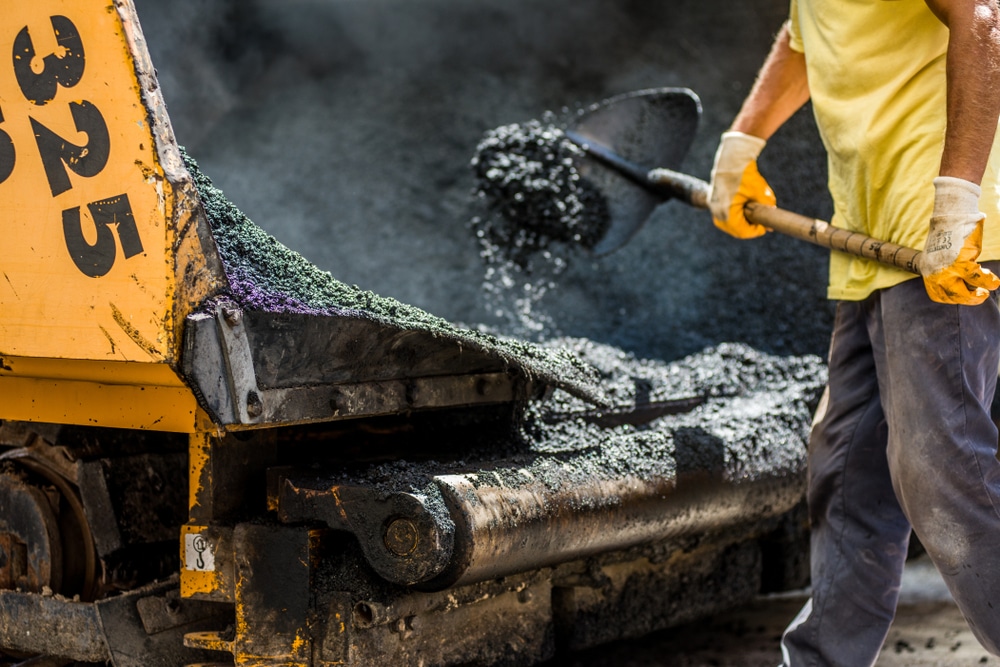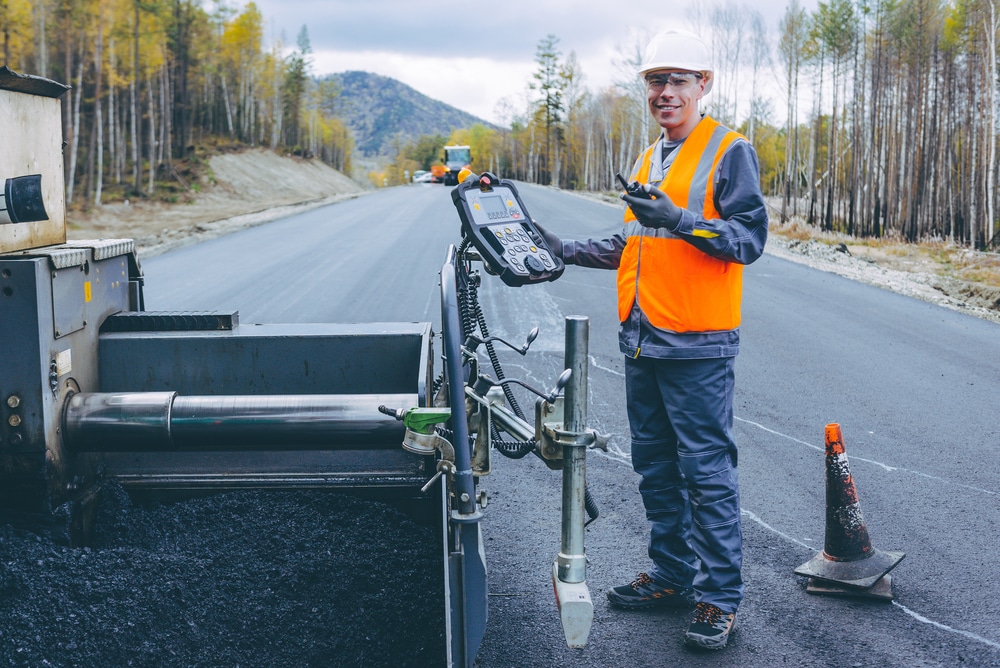Asphalt paving is a popular choice for roads, driveways and other surfaces that need to be durable yet attractive. It’s cost-effective, easy to install and offers superior performance compared with many alternatives. Asphalt provides an ideal balance of strength, flexibility and affordability that make it the preferred material for many construction projects. In this blog post we’ll look at some of the advantages asphalt has over other materials like concrete as well as when it makes sense to use asphalt instead of concrete or another option. We will also discuss maintenance requirements for asphalt paving plus costs considerations so you can decide if this is the right solution for your needs.
Table of Contents:
- Advantages of Asphalt Paving
- When to Use Asphalt Paving
- Concrete vs Asphalt
- Maintenance Requirements for Asphalt Paving
- Cost Considerations for Asphalt Paving
- FAQs in Relation to Asphalt Paving
- Conclusion
Advantages of Asphalt Paving
Asphalt is made up of an aggregate base material that is mixed with bitumen, a petroleum byproduct. This combination creates a strong surface that can withstand heavy traffic and extreme weather conditions.
When compared to concrete, asphalt has several advantages in terms of cost and longevity. Asphalt requires less maintenance than concrete over time because it does not crack or chip as easily as concrete does when exposed to temperature changes or heavy loads. Additionally, asphalt costs significantly less than concrete per square foot—making it the more economical option for many projects.
Installation of asphalt also tends to be faster than with concrete since it requires fewer steps in the process. The mixture used for asphalt paving can be applied directly onto existing pavement without having to first remove the old surface layer like you would need to do with concrete installation. This makes it ideal for resurfacing roads quickly without disrupting traffic flow too much during construction periods.
When To Use Asphalt Paving:
The best use cases for asphalt are on roads where there will be frequent vehicle traffic such as highways or city streets; parking lots; driveways; pathways; playgrounds; sports courts; golf courses; airports and any other outdoor areas where people walk or drive vehicles regularly. In addition, if your project involves slopes or curves then using asphalt may provide better traction which helps reduce skidding accidents from occurring on wet surfaces during rainstorms or snowfall events .
Concrete vs Asphalt:
Both materials have their own pros and cons depending on what type of project you’re doing but generally speaking both are great options when considering which one should be used in certain applications such as roadways , driveways , parking lots etc . Concrete typically lasts longer but requires more maintenance whereas asphalt needs less upkeep but won’t last quite as long . Also , when comparing price points between the two materials -asphalt usually comes out cheaper overall due to its quicker installation times & lower labor costs associated with laying down this type of pavement material .
Maintenance Requirements For Asphalt Paving:
To ensure your newly paved area remains safe & durable over time -it’s important that proper care & maintenance procedures are followed throughout its lifespan . This includes regular inspections (at least once every 6 months) along with filling cracks & potholes immediately after they appear ; sealing coatings should also be applied every 2-3 years depending on how much wear & tear has been experienced by the surface area being serviced . Additionally , removing debris (such as leaves/twigs ) from within crevices can help prevent water damage from occurring overtime which could lead to costly repairs down the line if left unchecked .
Cost Considerations For Asphalt Paving:
The total cost associated with installing an asphalt driveway depends largely upon factors such as size, complexity (slopes/curves), location etc. so prices will vary accordingly based off these criteria. However, regardless of those specifics – expect most projects involving this material to range anywhere between $2-$4 per square foot installed including all labor expenses involved. On top of that, additional fees may apply if extra services like grading/drainage systems need to be implemented prior to starting work, so make sure you factor those into your budget estimates ahead of time before signing any contracts.
Asphalt paving provides many advantages such as durability, cost-effectiveness, and ease of installation. However, it is important to understand when asphalt paving should be used in order to maximize its benefits.
When to Use Asphalt Paving
Asphalt is durable, cost-effective, and easy to maintain. It also provides superior traction in wet conditions compared to other materials such as concrete or gravel. Here are some of the most common uses for asphalt paving:
Driveways:
Asphalt is an ideal material for residential driveways because it’s relatively inexpensive and can be installed quickly. It’s also low maintenance; simply sealcoat every few years to keep it looking like new. Plus, its dark color helps hide oil stains that may occur over time due to vehicle traffic on the driveway surface.
Parking Lots:
Asphalt has long been used as a pavement material for commercial parking lots due to its durability and affordability when compared with concrete or other options such as pavers or bricks. In addition, asphalt surfaces provide better traction than concrete in wet weather conditions which makes them safer for pedestrians and drivers alike.
Roads made of asphalt have several advantages over those constructed with other materials such as gravel or dirt roads including improved safety due to their smoother surface texture which reduces skidding during rainstorms or icy winter months; increased longevity since they don’t need frequent repairs; less noise pollution from vehicles driving on them; lower costs associated with installation and repair; plus easier snow removal during winter months thanks to their darker coloration which absorbs more heat from the sun, helping melt away any snow accumulation faster than lighter colored surfaces would do so.
Overall, asphalt paving offers many benefits when used in various applications including driveways, parking lots, and roads making it an excellent choice for your next project. It is durable, cost-effective and easy to maintain while providing superior traction in wet conditions compared to other materials such as concrete or gravel. Additionally, its dark color helps hide oil stains that may occur over time due to vehicle traffic on the surface.
Asphalt paving is a great option for many road construction projects, but it’s important to understand when and where it should be used in order to get the best results. Now let’s look at how asphalt compares to concrete as another potential material choice.
Concrete vs Asphalt
Asphalt and concrete are two of the most popular materials used for paving roads, driveways, and parking lots. Both have their advantages and disadvantages that should be considered when deciding which material to use.
Advantages of Asphalt Paving
Asphalt is a cost-effective choice for many applications due to its low installation costs compared to concrete. It can also be installed quickly with minimal disruption to traffic or other activities in the area. Asphalt is highly durable and resistant to weathering, making it an ideal choice for areas with extreme temperatures or frequent freeze/thaw cycles. Additionally, asphalt surfaces can easily be repaired if they become damaged by potholes or cracks without needing major reconstruction work like you would need with concrete pavement repairs.
When To Use Asphalt Paving
Asphalt is best suited for areas where there will be heavy vehicle traffic such as highways, streets, parking lots, etc., because it has superior wear resistance over time compared to concrete surfaces. It’s also more forgiving than concrete on vehicles since it absorbs some of the shock from tires hitting bumps in the road better than rigid concrete does. For residential driveways or sidewalks where there won’t be much vehicle traffic but still needs a durable surface that looks good long-term then asphalt may still be a good option depending on budget constraints and other factors specific to your project location and requirements.
Concrete vs Asphalt
Concrete has been around longer than asphalt so it tends to have more established industry standards when being installed properly whereas asphalt installation processes vary widely from contractor-to-contractor leading potentially inconsistent results depending on who you hire for your job site . In terms of longevity both materials perform well under normal conditions however if exposed regularly to harsh elements such as salt water spray then one material may last longer than another depending on local climate conditions . Generally speaking though both materials are quite strong once set correctly into place although minor cracking may occur over time due mainly just from regular wear & tear rather than any inherent weaknesses within either material itself .
Cost Considerations For Asphalt Paving
The initial cost of installing an asphalt surface may be less expensive than a concrete surface; however, when you factor in the cost of ongoing maintenance over time, it may end up being more during the lifetime of the service area if not properly maintained. Therefore, it is important to consider all cost factors before making your final decision on which material to use on your project site.
When it comes to paving, both concrete and asphalt have their own advantages and disadvantages. However, when considering maintenance requirements, asphalt is often the preferred choice due to its ease of repair and long-term durability. Let’s explore what goes into maintaining an asphalt paved surface in more detail.
Maintenance Requirements for Asphalt Paving
Maintenance Requirements for Asphalt Paving
Asphalt paving is a popular choice for many road construction projects due to its durability and cost-effectiveness. However, like any other material, asphalt needs regular maintenance in order to keep it looking good and functioning properly over time. Here are some of the most important maintenance requirements for asphalt paving:
1. Regular Cleaning:
To maintain the aesthetic appeal of your asphalt pavement, you should regularly clean it with a power washer or broom. This will help remove dirt, debris, oil spills and other contaminants that can damage the surface over time. Additionally, regular cleaning helps prevent weeds from growing between cracks in the pavement.
2. Sealcoating:
Applying sealcoat every few years is one of the best ways to protect your asphalt pavement from weather damage such as UV rays and moisture penetration which can cause cracking and potholes over time. The sealcoat also adds an extra layer of protection against oils and chemicals that may be spilled on the surface by vehicles passing through it frequently.
3. Filling Cracks:
It’s important to inspect your asphalt regularly for signs of cracking or potholes so they can be filled promptly before they become larger problems down the line. Smaller cracks can usually be filled with crack filler while larger ones may require more extensive repair work such as patching or resurfacing depending on their size and severity level .
4 Patching & Resurfacing:
If there are large areas where patches have worn away due to heavy traffic or extreme weather conditions then these need to be patched up using hot mix asphalt followed by resurfacing if necessary in order to restore them back into shape again . This process involves removing existing layers of damaged pavement before laying down new ones which makes sure that all weak spots are eliminated completely .
Finally, line striping is essential when it comes to maintaining safety standards on roads paved with asphalt. This ensures drivers know exactly where they should drive at all times and helps reduce accidents caused by confusion about lane markings. Therefore, make sure you get this done periodically too.
Proper maintenance of asphalt paving is essential to ensure its longevity and performance. Next, we will discuss the cost considerations associated with this type of project.
Cost Considerations for Asphalt Paving
However, it’s important to consider the costs associated with asphalt paving before making a decision. Initial installation costs and ongoing maintenance are two key factors that should be taken into account when weighing your options.
Initial Installation Costs:
The initial cost of installing an asphalt pavement will depend on several factors, including the size of the project, type of material used, local labor rates, and more. Generally speaking, however, asphalt pavements tend to be less expensive than concrete pavements in terms of upfront installation costs. Additionally, since asphalt can often be installed faster than concrete (which requires curing time), there may also be savings in labor costs as well.
Asphalt pavements require regular maintenance in order to remain durable over time. This includes periodic sealcoating or resurfacing every few years depending on traffic levels and other environmental conditions such as weather or temperature extremes which can cause damage if not addressed promptly. Sealcoating helps protect against UV rays from the sun which can cause cracking and deterioration over time while resurfacing provides a new layer of protection for existing pavement surfaces that have become worn down due to heavy use or extreme weather conditions like snow or ice accumulation during winter months. While these maintenance tasks do add additional expense each year, they are necessary in order keep your pavement looking great for years to come.
It is important to note that while both materials offer similar benefits when it comes to durability and longevity, there are some differences between them worth considering when deciding which one is right for your project needs. Concrete tends to last longer but typically has higher upfront installation costs, whereas asphalt tends have lower upfront installation costs but requires more frequent maintenance throughout its lifespan compared with concrete surfaces which require less upkeep overall once installed properly initially.
Ultimately, it is up to you to decide what works best based on your budget requirements and any specific performance criteria needed by your particular application – whether residential driveway replacement or large scale commercial parking lot construction. Make sure to weigh all available options carefully before making a final decision.
FAQs in Relation to Asphalt Paving
Is Asphalt Paving cheaper than concrete?
The cost of asphalt paving and concrete paving varies depending on the size of the project, the type of materials used, and other factors. Generally speaking, asphalt is usually cheaper than concrete when it comes to large-scale projects such as roads or parking lots. Asphalt requires less material than concrete and can be laid faster due to its flexibility. Additionally, asphalt typically has a shorter curing time compared to concrete which reduces labor costs associated with installation. In some cases however, especially for smaller projects like driveways or sidewalks, the cost difference between asphalt and concrete may not be significant enough to justify choosing one over the other.
Is 2 inches of asphalt enough for a driveway?
It depends on the size of the driveway and the amount of traffic it will be subjected to. Generally, 2 inches of asphalt is enough for a residential driveway if it is properly compacted and sealed. However, if the driveway will be subject to heavy traffic or large vehicles, then more than 2 inches may be necessary in order to ensure durability and longevity. Additionally, thicker layers are often recommended for driveways with steep grades or slopes in order to prevent cracking or rutting over time.
How long does asphalt paving last?
Asphalt paving is a durable and cost-effective option for many road construction projects. When properly installed, asphalt can last anywhere from 10 to 30 years depending on the climate and amount of traffic it receives. In areas with mild climates and low traffic, asphalt may last up to 20 years or more. On the other hand, in areas with extreme temperatures or high levels of traffic, asphalt may need to be replaced after just 10 years. Proper maintenance such as sealcoating every 3-5 years can help extend the life of your pavement significantly.
1. Hot Mix Asphalt (HMA):
HMA is a mixture of crushed stone, sand and liquid asphalt binder that is heated and mixed together in a hot mix plant to create a durable paving material. It is the most commonly used type of asphalt for road construction because it can be easily shaped into any desired form and its durability makes it resistant to cracking or breaking under heavy traffic loads.
2. Cold Mix Asphalt:
Cold mix asphalt is made with an emulsion of oil, water, and aggregate that does not require heating before application on roads or driveways. This type of asphalt provides good coverage but has lower strength than hot mix asphalt due to its lack of binding agents like bitumen or tar.
3. Cutback Asphalt:
Cutback asphalt consists of pre-made mixtures containing bitumen, solvents such as kerosene, diesel fuel or mineral spirits, which are added after the initial production process to reduce viscosity so that the product can be applied more easily at cooler temperatures without requiring heaters during installation on roads or driveways.
Conclusion
In conclusion, asphalt paving is a great choice for many applications. It offers numerous advantages over other forms of paving such as durability, cost-effectiveness and ease of maintenance. When deciding between concrete and asphalt, it’s important to consider the application and budget in order to make an informed decision that best meets your needs. Asphalt paving can provide you with a long-lasting solution that will stand up to wear and tear while also providing you with an economical option for your project.
Asphalt paving is an important part of our infrastructure, but it requires regular maintenance and repair. If you’re a contractor looking for ways to provide high-quality asphalt services to your customers, then look no further! We have the tools and resources necessary to help you get started on successful projects that will last for years. With our experience in the industry, we can make sure that your work meets all safety standards while giving clients beautiful results they’ll be proud of. Contact us today so we can start helping you pave the way towards success!


